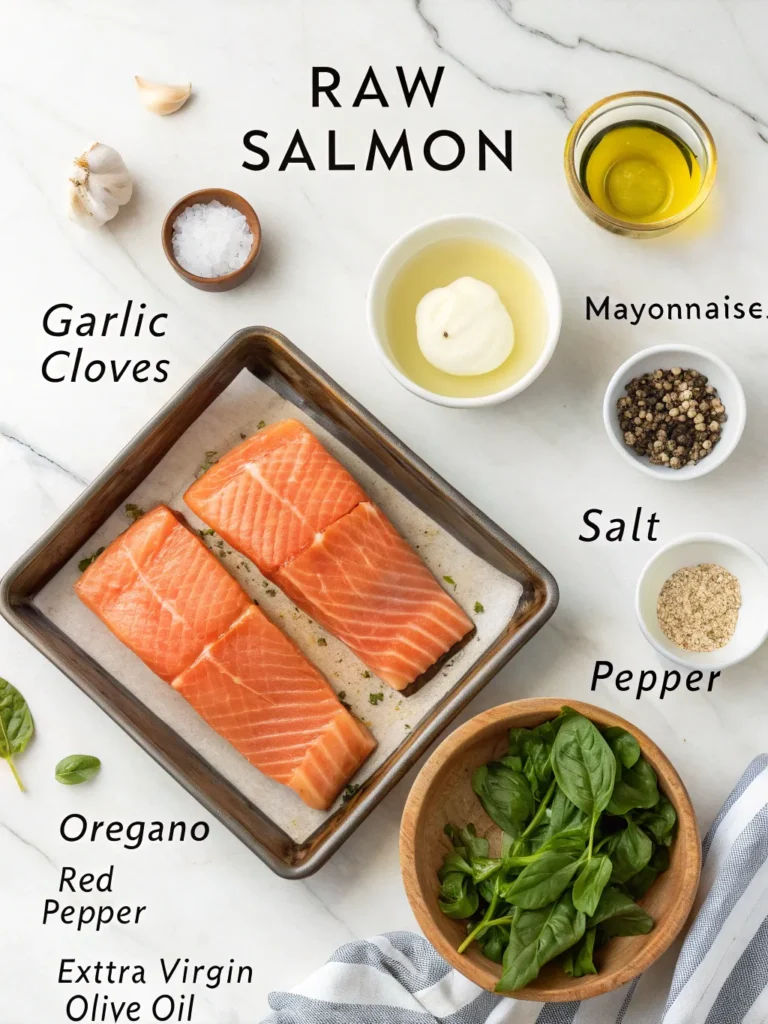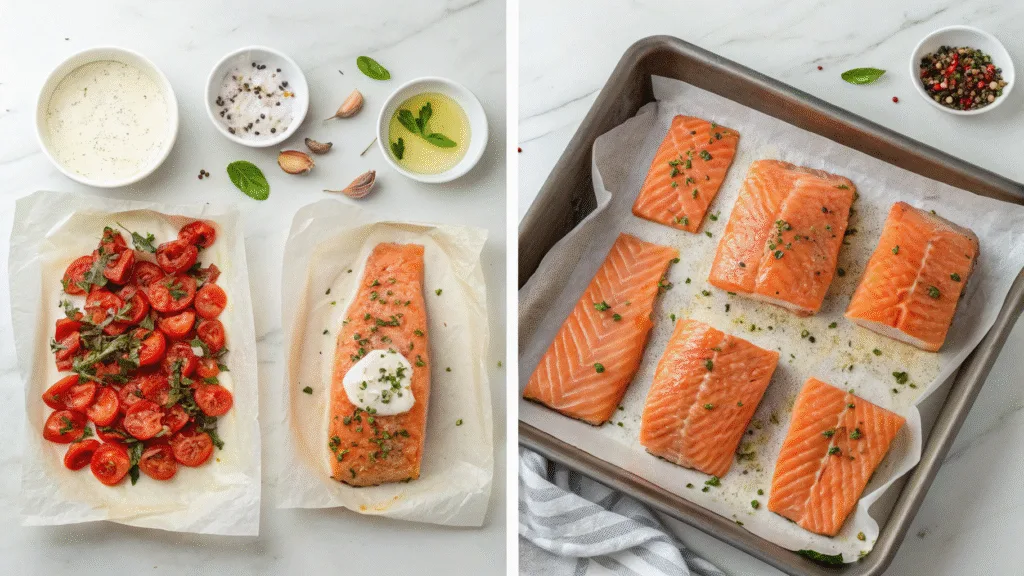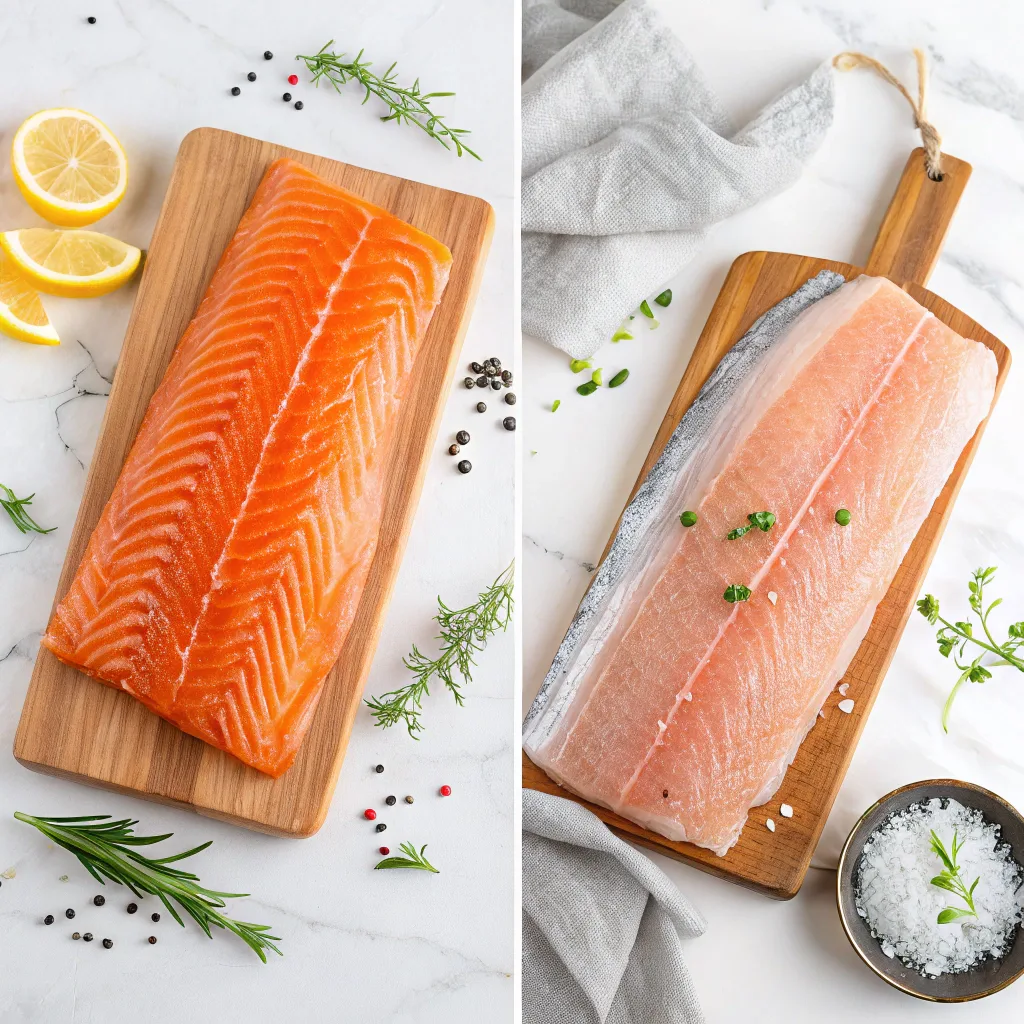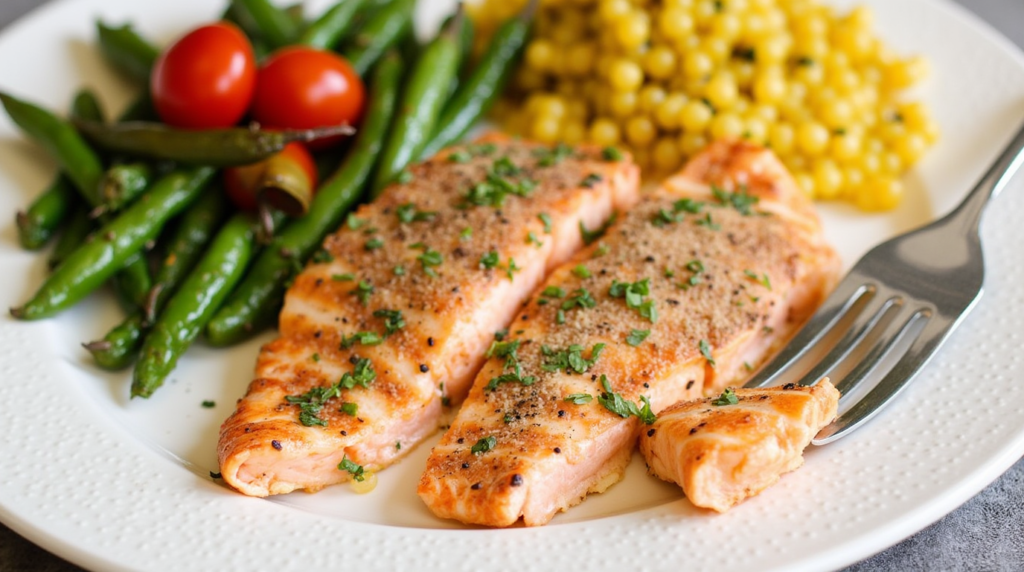Looking for a flavorful way to eat healthier without sacrificing taste?
Mediterranean salmon is the answer your kitchen’s been waiting for. Packed with fresh herbs, heart-healthy olive oil, and tender, flaky fish, this dish brings all the vibrant colors and bold flavors of the Mediterranean straight to your table. More than just delicious, it’s a nutritional powerhouse that supports heart health, boosts brain function, and satisfies your cravings all at once. In this guide, we’ll dive into the must-have ingredients, highlight the incredible health benefits, and walk you through simple, versatile ways to prepare this go-to Mediterranean classic.
Table of contents
Key Ingredients in Mediterranean Salmon
To make an authentic Mediterranean salmon dish, you’ll need a few key ingredients that capture the essence of the region’s cuisine. These ingredients are essential for creating a flavorful and healthy meal.

- Salmon: The star of the dish, packed with omega-3 fatty acids and protein.
- Olive Oil: Rich in monounsaturated fats that enhance flavor and provide health benefits.
- Feta Cheese: A tangy, creamy cheese that balances the richness of the salmon.
- Olives: Kalamata olives add a briny, savory note that complements the salmon perfectly.
- Fresh Vegetables: Tomatoes, onions, and bell peppers provide freshness and texture.
- Herbs and Spices: Oregano, basil, garlic, and lemon zest bring the Mediterranean flavors to life.
These ingredients combine to create a dish that’s not only delicious but also packed with nutrients.
How to Cook Mediterranean Salmon
Cooking Mediterranean salmon is simple and requires only a few steps. Here are some tips for preparing the perfect dish:

- Preheat your oven to 400°F (200°C) if you’re baking.
- Season your salmon fillets with olive oil, garlic, oregano, and lemon zest.
- Bake or grill your salmon for about 12-15 minutes or until it flakes easily with a fork.
You can also top the salmon with a mixture of fresh vegetables, olives, and feta cheese for added flavor. The key to perfect Mediterranean salmon is to cook it just enough so it remains moist and tender.
Fresh Salmon vs. Frozen Salmon: Which is Better?
When preparing Mediterranean salmon, the choice between fresh and frozen salmon can make a difference in taste and texture. Here’s a comparison to help you decide:

- Fresh Salmon: Typically, fresh salmon offers a better texture and flavor. It is ideal for grilling or baking, and the natural oils in the fish provide a moist, tender bite.
- Frozen Salmon: Frozen salmon is a great option if fresh salmon is not available. While the flavor may not be as vibrant, properly thawed frozen salmon can still yield a delicious dish.
For the best Mediterranean salmon recipe, opt for fresh salmon when possible. However, if you choose frozen, ensure it’s properly thawed and cooked thoroughly.
Mediterranean Herbs & Spices: The Heart of the Flavor
The key to Mediterranean cooking lies in its use of fresh, aromatic herbs and spices. These ingredients elevate the Mediterranean salmon and add depth to the dish. Some of the most popular herbs and spices include:
- Oregano: Known for its earthy and slightly bitter flavor, oregano is a staple in Mediterranean cuisine.
- Basil: This herb adds a sweet, slightly peppery flavor that complements the richness of the salmon.
- Garlic: Fresh garlic enhances the overall flavor profile with its aromatic, savory taste.
- Lemon Zest: The zest of fresh lemon brings a citrusy brightness that balances the richness of the fish.
- Thyme: Adds a subtle earthy flavor that pairs well with salmon and vegetables.
Using these Mediterranean herbs and spices will ensure your salmon is bursting with flavor.

Health Benefits of Mediterranean Salmon
In addition to its delicious taste, Mediterranean salmon offers numerous health benefits, making it an excellent choice for a balanced diet.
- Rich in Omega-3 Fatty Acids: Salmon is one of the best sources of omega-3 fatty acids, which support heart health, reduce inflammation, and improve brain function.
- High in Protein: Salmon is an excellent source of lean protein, essential for muscle repair and overall health.
- Rich in Vitamins and Minerals: Salmon provides vitamins B12, D, and selenium, all of which are vital for immune function, bone health, and antioxidant protection.
By incorporating Mediterranean salmon into your diet, you’re not just enjoying a tasty meal, but also benefiting from its nutrient-rich profile.
The Mediterranean diet is widely regarded as one of the healthiest eating patterns, with a strong emphasis on whole foods, healthy fats, and nutrient-dense ingredients. Incorporating Mediterranean salmon into this diet provides several heart health benefits:
- Heart-Healthy Fats: The olive oil, omega-3 fatty acids from salmon, and nuts in the Mediterranean diet promote healthy cholesterol levels.
- Reduced Risk of Heart Disease: Studies have shown that the Mediterranean diet can help reduce the risk of heart disease and stroke.
- Anti-Inflammatory: The Mediterranean diet is naturally anti-inflammatory, supporting overall cardiovascular health.
By adopting the Mediterranean way of eating and enjoying Mediterranean salmon, you’re supporting your heart health.
Grilling vs. Baking Mediterranean Salmon
Grilling and baking are two popular methods for preparing Mediterranean salmon. Let’s compare these two techniques to help you decide which one is best for your dish:
- Grilling: Grilling Mediterranean salmon gives it a smoky flavor and crispy skin. It’s ideal if you want a slightly charred, rich flavor.
- Preheat the grill to medium-high heat.
- Grill the salmon for about 4-5 minutes per side.
- Baking: Baking is a more hands-off method, perfect for ensuring the salmon remains tender and moist.
- Preheat your oven to 400°F (200°C).
- Bake for 12-15 minutes or until the salmon flakes easily with a fork.
Both methods are delicious, but grilling adds a bit of smoky flavor while baking retains more moisture.
How to Season Salmon for Mediterranean Flavor
The key to achieving authentic Mediterranean flavor lies in the seasoning. Here’s how to season your salmon for a Mediterranean-inspired dish:
- Olive Oil: Drizzle extra virgin olive oil over the salmon for a rich, Mediterranean taste.
- Herbs and Spices: Season with oregano, basil, garlic powder, and a pinch of salt.
- Lemon Zest: Add fresh lemon zest to brighten the flavor and balance the richness of the fish.
- Feta Cheese and Olives: Top with crumbled feta cheese and sliced Kalamata olives for that signature Mediterranean touch.
These simple ingredients will transform your salmon into a flavorful Mediterranean delight.
Mediterranean Salmon Side Dishes
Pairing Mediterranean salmon with the right side dishes can elevate your meal. Here are some ideas for delicious sides that complement the flavors of the salmon:
- Greek Salad: A fresh mix of cucumbers, tomatoes, red onions, and feta cheese with a lemon-oregano dressing.
- Roasted Vegetables: Roasted zucchini, eggplant, and bell peppers bring out the sweetness of the vegetables and complement the salmon perfectly.
- Quinoa or Couscous: These whole grains are the perfect base for soaking up the juices from the Mediterranean salmon.
- Tzatziki Sauce: A refreshing yogurt-based sauce made with cucumber, garlic, and dill, perfect for drizzling over the salmon.
These side dishes add variety and complement the vibrant flavors of the Mediterranean salmon.
Mediterranean Salmon Recipe: Delicious Pairings and Variations for a Healthy Meal
Mediterranean cuisine is celebrated for its vibrant flavors and nutrient-packed ingredients. When combined with the rich taste of salmon, it creates a dish that is both satisfying and healthy. This article explores perfect pairings, popular recipe variations, and tips for creating the ultimate Mediterranean salmon dish that will leave your taste buds craving more. Whether you’re preparing it for a family dinner or a special occasion, the following insights will help you make the most of this flavorful recipe.
Try this delicious Mediterranean Salmon recipe with olive oil, garlic, and lemon.
Inspired by
Roasted Vegetables Pairing with Mediterranean Salmon
Roasted vegetables are an excellent side dish that complements the flavors of Mediterranean salmon. The natural sweetness and savory profile of roasted vegetables balance the richness of the fish, creating a well-rounded meal.
- Zucchini and Eggplant: These vegetables are staples in Mediterranean cuisine and pair perfectly with salmon. Their subtle sweetness contrasts well with the savory flavors of Mediterranean herbs.
- Bell Peppers: Roasted red or yellow peppers add a burst of color and sweetness to the dish, making it more visually appealing.
- Carrots and Cherry Tomatoes: Roasted carrots bring out a natural sweetness, while cherry tomatoes add juiciness and a slight acidity that complements the salmon.
Roasting the vegetables with olive oil, garlic, and oregano will enhance the Mediterranean flavors of the entire dish.

Quinoa and Grain Pairings for Mediterranean Salmon
Quinoa and other whole grains are excellent companions for Mediterranean salmon due to their mild flavor and ability to absorb the rich juices from the salmon. These grains are not only healthy but also provide a satisfying texture to complement the fish.
- Quinoa: This protein-packed grain is a perfect base for your Mediterranean salmon. It’s gluten-free and rich in fiber, making it a great choice for a nutritious meal.
- Couscous: While traditionally paired with Moroccan dishes, couscous works wonderfully with Mediterranean salmon due to its light and fluffy texture. It also absorbs flavors well, making it a versatile option.
- Farro: A bit more hearty, farro pairs well with the richness of salmon. Its chewy texture makes it a satisfying addition to the dish.
This is one of my recipes, inspired by the Mediterranean Salmon from Allrecipes It’s made with salmon and Mediterranean ingredients like lemon, olive oil, and herbs.
Popular Variations of Mediterranean Salmon Recipe
The beauty of Mediterranean salmon is its versatility. By swapping or adding a few ingredients, you can easily make variations that cater to different tastes or dietary preferences.
- Lemon Garlic Mediterranean Salmon: Add extra lemon zest and garlic to elevate the flavor. A squeeze of fresh lemon juice just before serving enhances the freshness.
- Mediterranean Salmon with Avocado Salsa: Combine avocado, tomatoes, red onions, and cilantro for a refreshing salsa that adds a creamy texture and a burst of flavor.
- Pesto-Crusted Mediterranean Salmon: Use a basil pesto crust to enhance the flavor, adding a nutty richness that pairs beautifully with the fish.
These variations can be easily adapted to suit your preferences and elevate your Mediterranean salmon experience.
Greek Style Salmon: A Mediterranean Twist
A Greek-style Mediterranean salmon recipe is one of the most popular variations, bringing out bold flavors and fresh ingredients. This version focuses on ingredients often found in traditional Greek cuisine.
- Olives: Kalamata olives are a key ingredient in Greek dishes and add a salty, briny flavor that complements the richness of the salmon.
- Feta Cheese: Crumbled feta cheese provides a creamy texture and tanginess, creating a wonderful contrast to the savory salmon.
- Cucumber and Tomato Salad: A fresh salad with cucumber, tomatoes, and red onions adds crunch and acidity, balancing the richness of the salmon.
This variation not only brings a taste of Greece to your table but also maintains the healthy principles of the Mediterranean diet.
Tips for Perfecting Your Mediterranean Salmon Recipe
Creating the perfect Mediterranean salmon requires attention to detail. Here are some tips to ensure your dish turns out delicious every time:

- Don’t Overcook the Salmon: Salmon should be cooked until it’s just opaque and flakes easily. Overcooking can lead to dry, tough fish.
- Use Fresh Ingredients: Fresh Mediterranean herbs like oregano and basil make a significant difference in flavor.
- Marinate the Salmon: Marinating the fish for 20-30 minutes in a mixture of olive oil, garlic, lemon juice, and herbs enhances the flavor and keeps the salmon moist.
- Choose the Right Cooking Method: Whether you prefer grilling or baking, make sure to adjust the temperature and cooking time to ensure the best texture.
These small adjustments can significantly improve your Mediterranean salmon recipe.
Skin On vs. Skin Off Salmon: Which to Choose?
When preparing Mediterranean salmon, the decision to cook with the skin on or off can affect both the flavor and texture of the fish.
- Skin On: Cooking salmon with the skin on helps retain moisture and provides a crispy texture when grilled or roasted. It also helps prevent the fish from falling apart.
- Skin Off: Removing the skin gives the salmon a cleaner look and makes it easier to serve. If you prefer a more delicate texture, skinless fillets may be the best choice.
Both options work well with Mediterranean salmon, so choose based on your texture preference.
FAQ – Frequently Asked Questions
How long does it take to cook Mediterranean salmon?
The cooking time for Mediterranean salmon varies depending on the method and thickness of the fillet. Generally, it takes about 12-15 minutes to bake at 400°F (200°C), or 4-5 minutes per side when grilling.
Can I use other fish instead of salmon?
While salmon is ideal due to its rich texture and flavor, you can substitute other fish like trout, tilapia, or mackerel. Keep in mind that cooking times may vary based on the type of fish you use.
Is Mediterranean salmon good for weight loss?
Yes, Mediterranean salmon is an excellent choice for weight loss. It’s high in protein and omega-3 fatty acids, which can help with satiety and promote fat loss. Pairing it with low-calorie sides, like roasted vegetables or quinoa, further supports weight management.
Can I freeze Mediterranean salmon leftovers?
Yes, you can freeze leftover Mediterranean salmon. Place the cooked salmon in an airtight container or wrap it tightly in foil or plastic wrap before freezing. It can be stored for up to 3 months.
Conclusion
Mediterranean salmon is not just a meal; it’s a healthy, flavorful experience that can be tailored to suit any occasion. From pairing it with roasted vegetables or quinoa to exploring variations like Greek-style salmon, the possibilities are endless. By following simple tips for perfect texture and seasoning, you can enjoy a delicious Mediterranean dish that’s both nutritious and satisfying. Whether you’re grilling, baking, or experimenting with different flavors, Mediterranean salmon will never disappoint.

Mediterranean salmon
Equipment
- baking sheet
- Mixing bowl
- Knife
Ingredients
- 4 salmon fillets
- 2 cloves garlic minced
- 1 tablespoon mayonnaise
- 1 teaspoon dried oregano
- 1 teaspoon red pepper flakes
- Salt to taste
- Fresh basil chopped
- Sun-dried tomatoes chopped
- 2 tablespoons extra virgin olive oil
Instructions
- Preheat the oven to 375°F (190°C).
- Season the salmon fillets with salt, pepper, and dried oregano.
- In a small bowl, mix mayonnaise and minced garlic. Spread the mixture over the salmon.
- Top the salmon with chopped sun-dried tomatoes, fresh basil, and drizzle with olive oil.
- Bake in the preheated oven for 15-20 minutes, or until the salmon is golden and flakes easily with a fork.
- Remove from the oven and let rest for 5 minutes before serving.
- Nutrition:
- These values are for 1 serving of the recipe (1 salmon fillet).
- Calories: 320 kcal
- Protein: 25g
- Fat: 22g
- Carbohydrates: 6g
- Fiber: 1g
- Sugar: 2g
Notes
- You can serve the salmon with a side of vegetables or a light salad for a complete Mediterranean meal.
- Adjust seasoning to taste, and add more or less olive oil based on your preference.



1 thought on “5 Simple Steps to Make Mediterranean Salmon”